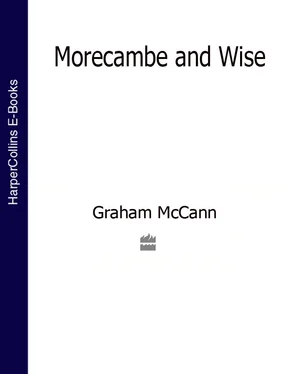Although Eric was an only child he did not want for the companionship of friends of his own age. He was well liked by most of the other children in the area. He joined in all the chaotic games of football with the other boys in the park at the back of Christie Avenue, and accompanied several of his friends on their regular visits to Halfway House – the local sweet shop. On most weekends, he queued with his cousin ‘Sonny’ Threlfall outside the Palladium cinema – known affectionately as ‘The Ranch’ – to see the latest movies (Westerns were his favourite) and, during relatively uneventful moments, fire peashooters at bald-headed men in the rows below.
Morecambe – like most English seaside resorts – was a place of stark, seasonal contrasts: cold, dull and quiet in the winter months; warm, bright and noisy in the summer months. Eric, looking back on his childhood, would describe his memories of his home town as ‘serene and ageless. They emerge vivid and sharp. Happy and bright, not dull and ugly.’ 15One of the clearest images was of seeing his parents share the ‘supreme joy’ of sitting together and ‘watching the Turneresque sunset over Morecambe Bay’. 16
The town, in those days, was often referred to formally as part of a broader area – ‘Morecambe and Heysham’. Morecambe, as Eric would take pleasure in pointing out, ‘was a double act long before I met Ernie’. 17Spring, as far as Eric was concerned, was the season that marked the town’s sudden re-awakening, and summer the enchanting time when the town ‘became a different place’. 18As the temperature began to rise and the sun started to shine, the town moved rapidly from being a rather insular and unobtrusive Lancashire town to become a lively centre for recreation, a welcoming place that boasted all kinds of entertainment.
Morecambe – the ‘Naples of the North’, a ‘smaller Blackpool’ 19– was at this time in the process of creeping gentrification. The process culminated in the early thirties with the establishment of the art deco Midland Hotel, an ambitiously lavish new high-style building on the seaward side of the promenade that soon attracted the likes of David Niven, Mrs Wallis Simpson and Noël Coward. In the summer, as the holiday season began and strangers flocked to the town from all directions, it was, said Eric, ‘like being brought up to date; finding out what was going on in the world. You never saw many cars in those days, yet August brought a veritable motorcade of Austin Sevens and Morris Eights driven by the “well-to-do” paying their £3 a week, full board at the town’s desirable residences.’ 20
On the sands, littered with sleepy bodies slouched deep in deckchairs and mazy formations of energetic boys and girls, the regular daily entertainment was provided by ‘the Nigger Minstrels’ – ‘then undeterred’, Eric would later note, ‘by the racial overtones of their titles’. 21They would sometimes hold talent contests, and Eric, whenever possible, would enter them – winning on at least three occasions (after his last success, he recalled, ‘They found out I was a local boy and stopped me from entering.’ 22). Summer also brought with it the prospect of a chance sighting of a visiting celebrity, and Eric was particularly excited one year to see ‘the magnificent’ portly British movie star Sydney Howard 23– fresh from appearing in Shipyard Sally (1939) alongside Gracie Fields – strolling sedately along the pier. The season always ended with the relatively modest but rather beautiful illuminations, a final few visits to the ‘fairyland’ of Happy Mount Park and the first chill winds that accompanied the holidaymakers’ ‘final glimpse of annual escape’. 24
‘I was proud’, Eric would say, ‘to know that people came to my town for a holiday. It always seemed a pity that they couldn’t stop the whole year round [because] in those golden growing up years, there was a sort of magic about Morecambe. It had a lot to offer and I took it.’ 25The one place in town, however, where it seems that he usually took rather less than was being offered him was the classroom: ‘I wasn’t just hopeless in class,’ he said. ‘I was terrible.’ 26This was, typically, something of an exaggeration – he was far from being a slow-witted young boy, and there is some evidence to suggest that he showed a reasonable aptitude for certain subjects, 27but, nevertheless, school was never a place that would ever be able to command his full attention.
He attended two schools in Morecambe: Lancaster Road Junior and then, with markedly less frequency and enthusiasm, Euston Road Senior. He was, to begin with, happy enough to set off there each morning – particularly because Sadie allowed him to take with him a bag of his favourite confection – ‘cocoa dip’, a mixture of cocoa powder and sugar: ‘The idea was to have the bag open in my coat pocket and keep dipping a wet finger into the mixture ... at regular intervals on the way to school. It was like nectar.’ 28
In time, however, a combination of boredom and, increasingly, absenteeism ensured that the standard of his work declined alarmingly: ‘I spent most of my time’, he later confessed, ‘in the school lavatory smoking anything I could ignite.’ 29Sadie, who had hoped that her son would do well enough to go to a grammar school, was too attentive a mother to have remained unaware of the problem for very long, but, when the school reports started to underline just how poorly he was faring, she felt shocked and angry.
One report in particular, which arrived at the Bartholomew house early in April 1936, announced curtly that the nine-year-old Eric was forty-fifth out of forty-nine pupils (although, judging from his marks, it is not at all clear how he managed to come ahead of the other four). A teacher’s scribbled addendum – ‘He was absent most of the exams’ – pointed out an obvious contributory factor. 30Sadie (it appears that George left such responsibilities to her) wrote back to the school immediately, declaring on the back of the same sheet: ‘I am disgusted with this report, and I would be obliged if you would make him do more homework,’ adding, menacingly as far as Eric was concerned, ‘I would see he did it here.’ 31She, typically, was determined that her son should arrest his dizzying decline as speedily as possible and then – she hoped – start to improve. After visiting his school and talking to several of his teachers, however, Sadie was, eventually, forced to accept the fact that he was never going to achieve the academic success she had dreamed of. ‘Mrs Bartholomew,’ said the headmaster, ‘I’ve been teaching boys for thirty years. Take my advice. It would be a complete waste of time [to expect any improvement].’ She had offered to pay for further tuition but was told, ‘It would be money down the drain.’ 32
This rejection only seemed to spur Sadie on in her search for a suitable career for Eric. It surprised no one who knew her that she reacted to the undeniably deep disappointment of this setback in such a remarkably spirited and positive manner. Her most passionate wish was for her son to grow up to five a better and more rewarding life than either she or her husband had known, and, even if that wish did not seem likely to be realised through academic achievement, she was not prepared to abandon it. Eric’s widow, Joan – who would in later years come to know Sadie extremely well – stressed how committed she was to her son’s betterment:
She really was a good woman. She was hard, yes, in some ways, but she had to be a hard woman in that kind of harsh environment. She wasn’t the sort of pushy ‘stage mother’ that some people have portrayed her as being. She didn’t keep pushing Eric because she wanted fame and fortune through her child. She was much too fair and too intelligent for that to be her motive. Everything she did, she did for Eric’s sake. Just after Eric was born, George had had a terrible accident playing football, he’d broken his leg, and they’d wanted to amputate it, the breaks were so severe. He’d refused, and luckily his leg was OK, but it was something like two years before he was able to work again – and all through that time Sadie went out to work while George stayed at home with Eric, and she really had to work to keep them all going. That was the great strength these people had, and Sadie was not just strong but also, in so many ways, so shrewd and far-seeing. 33
Читать дальше











![Brian Thompson - A Monkey Among Crocodiles - The Life, Loves and Lawsuits of Mrs Georgina Weldon – a disastrous Victorian [Text only]](/books/704922/brian-thompson-a-monkey-among-crocodiles-the-life-thumb.webp)
